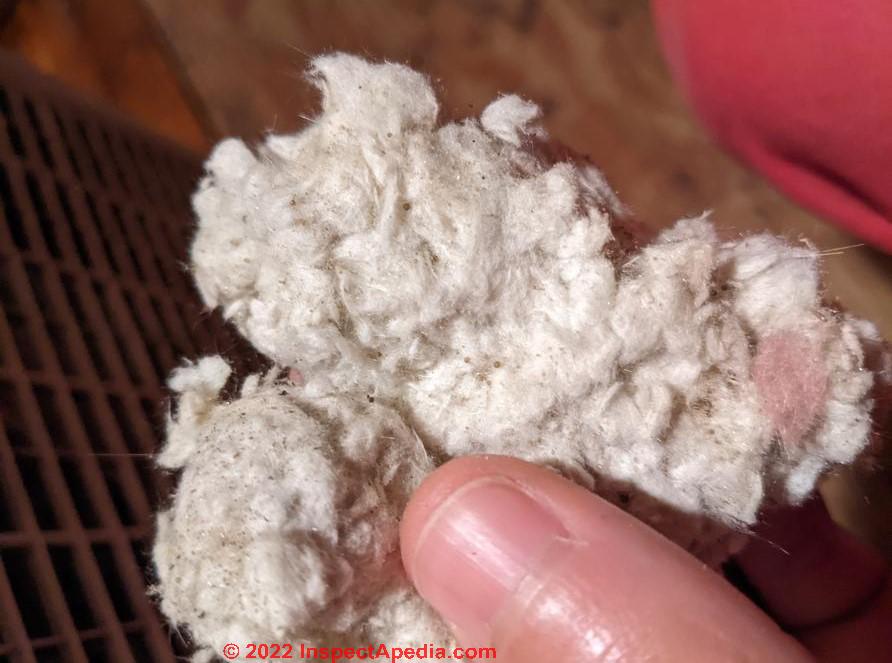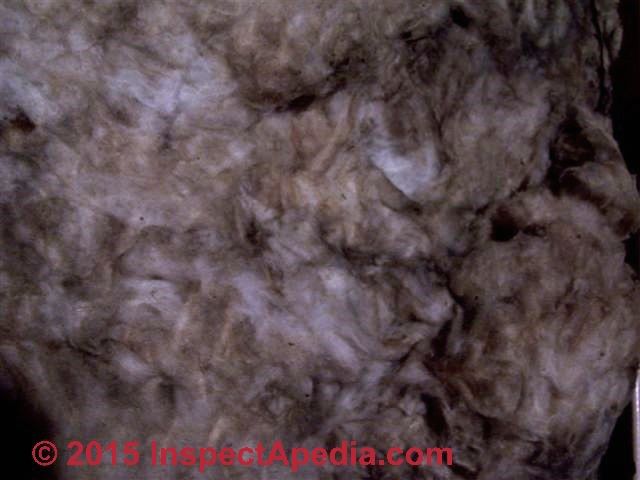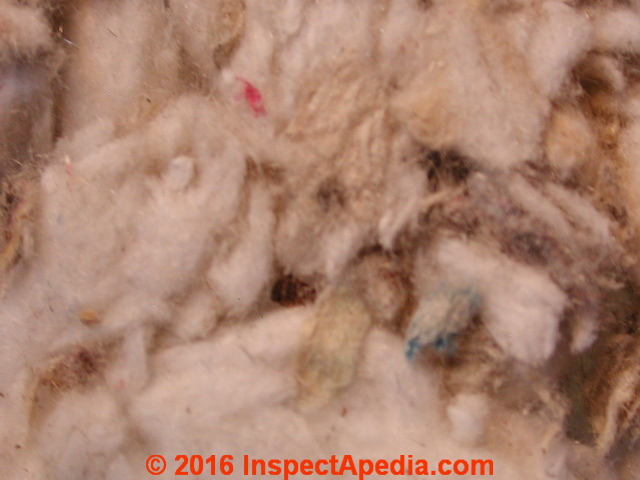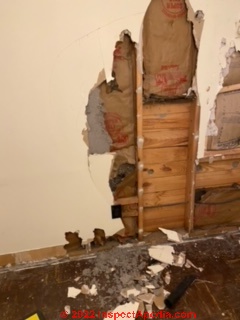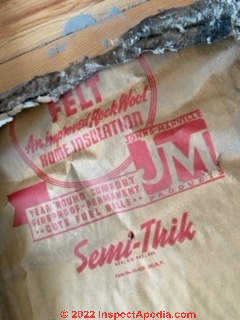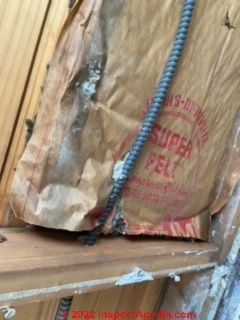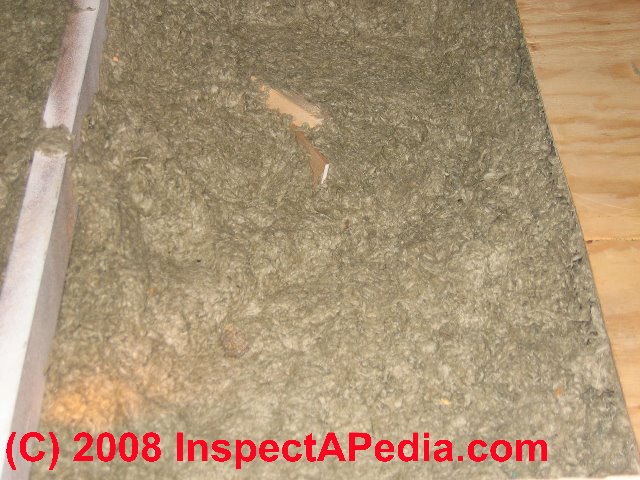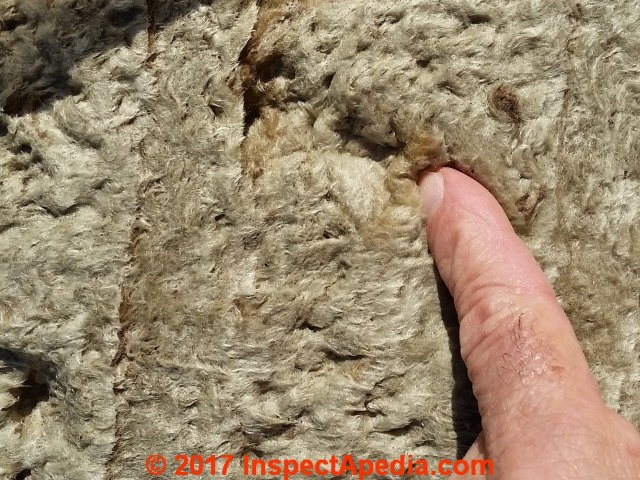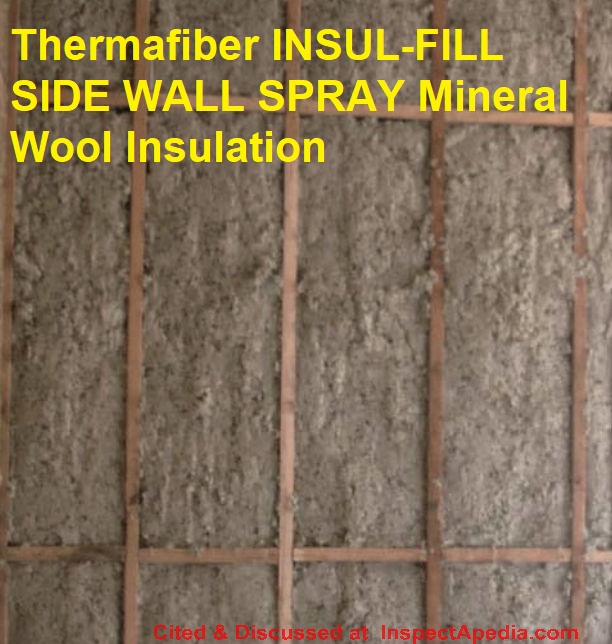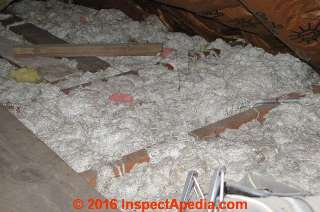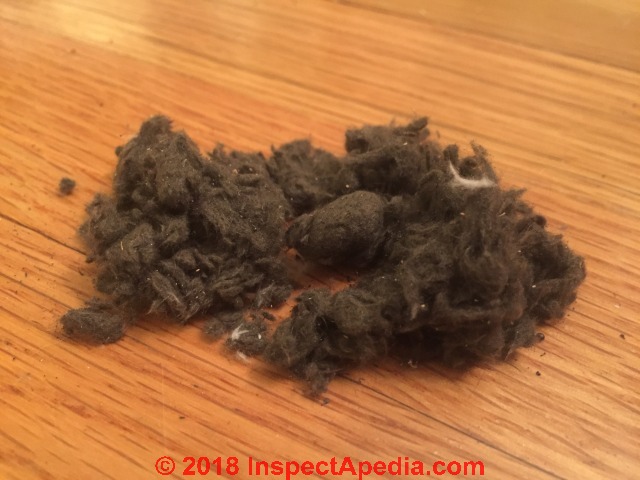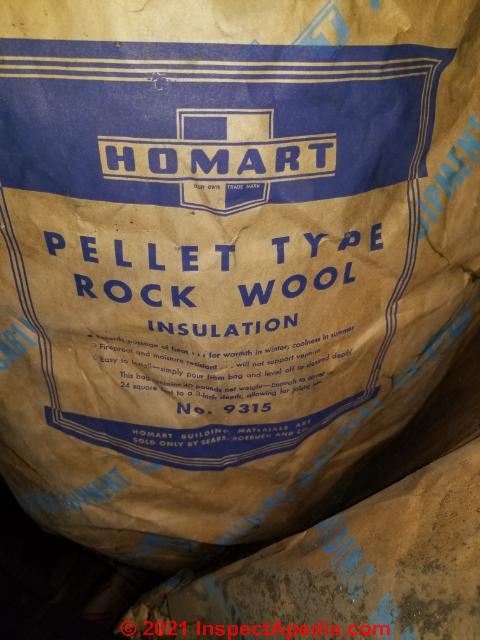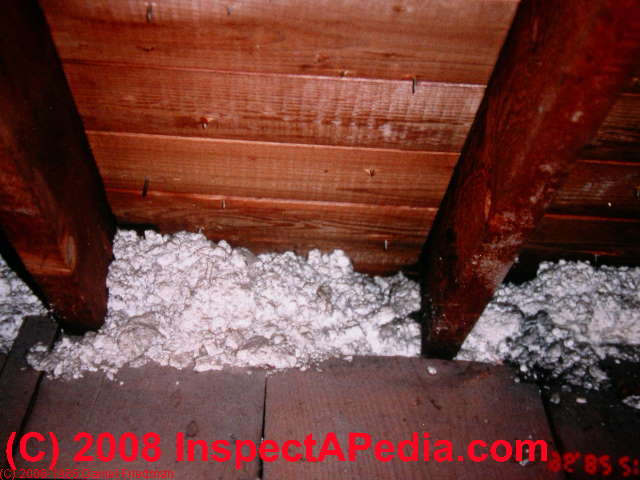 Visual Identification of Rock Wool, Stone Wool, Mineral Wool, & Slag Wool Building Insulation
Visual Identification of Rock Wool, Stone Wool, Mineral Wool, & Slag Wool Building Insulation
What does mineral wool look like?
What color is slag wool insulation?
- POST a QUESTION or COMMENT about Rock Wool mineral fiber insulation
Rock wool or mineral wool insulation appearance:
This article describes what mineral wool insulation looks like.
Mineral wool or "rock wool" (also written "rockwool" or slag wool may be installed as chopped or stranded material, loose fill or in batts, usually white but possibly gray or with yellow, gold or other colors imparted by a resin binder or characterized by the mineral fiber source.
This mineral wool or "rock wool" insulation article series illustrates and describes mineral wool or "rock wool" and slag wool insulation materials. This document assists building buyers, owners or inspectors who need to identify various insulation materials in buildings by simple visual inspection.
InspectAPedia tolerates no conflicts of interest. We have no relationship with advertisers, products, or services discussed at this website.
- Daniel Friedman, Publisher/Editor/Author - See WHO ARE WE?
Mineral Wool Identification Photos
 Mineral wool is generally a dull white but may be fairly homogeneous gray (shown earlier on this page) or mineral wool may look very dark, even black, especially in older buildings.
Mineral wool is generally a dull white but may be fairly homogeneous gray (shown earlier on this page) or mineral wool may look very dark, even black, especially in older buildings.
Article Contents
- BLACK or DARK BROWN MINERAL WOOL
- CAREY ROCK WOOL CATALOG 1950 [PDF] - separate page
- FELTROCK BRAND MINERAL WOOL - Tacoma Washington
- GRAY BROWN MINERAL WOOL - ThermaFiber
- GRAY ROCKWOOL - SuperFelt from Johns Manville
- GRAY-WHITE MINERAL WOOL
- ORANGE LUMPY MINERAL WOOL
- PINK MINERAL WOOL
- SEARS / HOMART BRAND MINERAL WOOL
- SPINTEX BRAND MINERAL WOOL PROPERTIES - MANSVILLE - separate page
- WHITE STRINGY LONG-FIBER MINERAL WOOL
- WHITE MINERAL WOOL
Mineral wool, that some folks call slag wool, rock wool, stone wool, or "rockwool" may appear in chopped form, in batts, in faced batts, and in chopped stringy material that we illustrate later in this article.
Mineral wool also appears in a range of colours, principally whitish but also gray, yellow and white, pink and white, or dull white with colored flecks of included materials.
Rockwool is also a trademark discussed at MINERAL WOOL - ROCK WOOL INSULATION
...
White Mineral Wool Insulation
The most-common appearance of mineral wool insulation is shown in our photo of the white material in the attic eaves of our photograph at the top of this page, the white mineral wool photo mixed with scraps of wood shingles at the start of this article, and the closeup of white mineral wool insulatin from a 1928 Sears House - just above.
Notice that while white mineral wool insulation is mostly white, it sometimes contains some dark gray-white areas. Those darker areas are not mold but may be dust particles from other sources such as air bypass leaks.
Often the black or gray discoloration is due to particle deposition from air bypass leaks. You'll see that some of the mineral wool photos in this article series also include newer yellowish product, typically a resin binder.
...
Gray-white Mineral Wool Insulation
Some mineral wool insulation was produced to include additional fibers of flax, jute or other materials to resist settling.
Below is a photograph of Johns Manville's Spintex™ Rock Wool Insulation showing the most-common gray-white color of this insulating material.
Spintex™ foil faced insulating batts produced by Manville were sold in thicknesses up to 6 inches. Rock wool is not an asbestos material.
While asbestos is not normally found in rock wool or mineral wool, there were some (rare) exceptions, discussed
at ASBESTOS IN MINERAL WOOL / STONE WOOL.
Let's look at more photos of the appearance of mineral wool insulation.
...
Pink Mineral Wool Insulation
As you can see in our first photo below, mineral wool insulation is not necessarily stark white.
And this pink mineral wool might even be mistaken for fiberglass insulation. It's not.
...
Gray Mineral Wool or Rockwool Insulation
Above and below: Gray Rockwool insulation produced by JM - Johns Manville, found in a Rochester New York home built in 1946.
Johns Manville Semi-Thik "felt batt insulation" (Rock Wool)
I just wanted to share insulation information for gray Johns Manville insulating batts faced with kraft paper and labeled as JM Felt Semi-Thik and as JM Super Felt insulation product no. H1-43A.
I recently bought a home and decided to fix some drywall in a side room. I came across some insulation that made me nervous.
It was Johns Manville Super felt batt insulation. The paper had product no. H1-43A.
I sent samples to be tested but also did some research and couldn’t find this particular one that had brown paper with red print.
I also called Johns Manville and was told it would have been for the 50’s or 60’s and they destroyed records. They could not identify the product. The attorney actually told me she never heard of the super felt line.
Good news the test came back negative for asbestos.
I am attaching photos. I tested the super felt and the loose fill in the pictures. - Anonymous by private email - 2022/02/09
Moderator Reply:
Thank you for the JM Mineral Wool or "Rockwool" photos and asbestos test report. Readers wondering about asbestos in these JM products should also
...
Gray-Brown Mineral Wool Insulation
Above and below our photos of mineral gray-brownish mineral wool insulation, seen close-up, illustrates a contemporary product installed in a New York home in 2002.
This mineral wool insulation is mostly white but contains darker areas of yellowish resin and colored fragments of cellulose (paper) insulation.
Below: a close-up of a dense-packed gray-brown mineral-wool insulating batt at a Vassar College construction site in Poughkeepsie, New York in 2016.
Below: gray-brown-tan mineral wool insulation blown into a wall - Thermafiber Insul-Fill from Owens Corning.
More photos of this insulation product are
...
Stringy White Long-Fiber Mineral Wool Insulation
Is this white stringy insulation mineral wool?
This insulation looks like balls of string and feels like a type of mineral wool. Please let me know if you can identify it.
[Click to enlarge any image]
The house where this insulation is installed is located in Hackettstown, NJ, and was built in 1930. But many changes and additions to the home have occurred since then.
Some areas lack any insulation at all. The insulation pictured is loose fill with no identifying facing or bags found. [The buyer ]is in construction and has also never seen an insulation material like this.
The only question is whether it could possibly be asbestos containing. [We think ] that, although it does not look typical of an asbestos containing material, the only way we could rule it out is to send a sample to a lab for analysis.
- Anonymous home inspector, by private email, 2016/11/15
Reply:
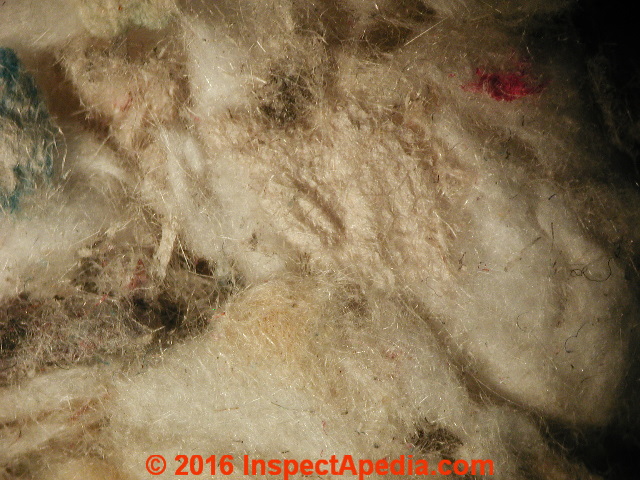 To me too it looks like mineral wool insulation, though I've not seen this specific twisted pattern before. As you probably saw, there are also some scraps of yellow fiberglass insulation mixed in with what is probably antique mineral wool insulation loose-filled in place.
To me too it looks like mineral wool insulation, though I've not seen this specific twisted pattern before. As you probably saw, there are also some scraps of yellow fiberglass insulation mixed in with what is probably antique mineral wool insulation loose-filled in place.
Other readers are welcome to help out with a comment about this insulation using the page bottom COMMENTS BOX or you can send us email and photos using the page top or bottom CONTACT link .
Our photo showing a close look at white mineral wool insulation was taken in a home built in 2002. To compare these mineral wool insulation pictures with fiberglass insulation,
see FIBERGLASS INSULATION IDENTIFICATION & PROPERTIES.
The age and location of the home are consistent with use of mineral wool insulation, and as we discussed by email, it would be not impossible but quite unusual to find asbestos attic insulation in any residential home much less in this form.
I speculate that this mineral wool product was produced in longer wound strands for ease of handling during manual placement in the attic floor.
Later alternative "blown-in" and "poured-in" insulation products had to be chopped for easier placement requiring less hand labor.
If you want to send me a sample to examine in our lab - if you have some - let me know. I should at least be able to rule cotton and asbestos out and probably can rule mineral-fiber or slag wool insulation "in".
Researching for images of "rope-like mineral wool" it is interesting to note that there are current manufacturers of thermal insulation mineral wool rope and braid, such as the Zibo Jiuqiang refractory Co., a Chinese firm.
...
Dark Brown Near Black & Mixed White/Black Mineral Wool Insulation
Is this dark brown fibrous insulation rock wool?
My brother posted this photo under the name Josh and asked if this insulation was asbestos and asked if you could identify the material.
We had someone doing work in our house recently that caused some insulation to fall from our attic, and he was very dramatic about it being asbestos-contaminated insulation.
Everything I could find suggested it likely wasn't, but the information online can of course be a bit contradictory depending on the source.
Reply: Lab analysis of your sample found mineral wool wool or "rock wool" / slag wool insulation.
Initial report:
The insulation that you mailed to me is mineral wool or "rock wool" - of various sizes and colors, mostly white (or colorless); there is black asphalt, perhaps as a binder, in some of the material and some fibers that are dark are most-likely made from cinders or slag.
There are typical contaminants of old insulation: fungal hyphal fragments, a few fungal spores, non-fungal granular debris. I didn't see rodent nor insect fragments but then, by no means was the examination exhaustive. When I have photos and other notes ready I'll pass that on to you as well.'
I did not detect fiberglass nor asbestos fibers in the three sub-samples (from your whole mailing) that I examined.
Photographs of your insulation in our lab are at the end
of MINERAL WOOL by MICROSCOPE where we include details about our examination of this rock wool sample.
At MINERAL WOOL / STONE WOOL ASBESTOS CONTENT you will see that mineral wool is not an asbestos product though there could have been instances of mineral wool having been cross-contaminated with asbestos - an uncommon situation.
...
Dark Orange Mineral Wool Insulation in a 1948 Home
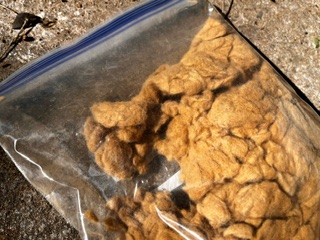
Our InspectApedia reader asked:
Wondering if you could help me identify this orange lumpy fibrous insulation; it’s loose fill from my attic. House built in ‘48, I bought the place back in ‘94.
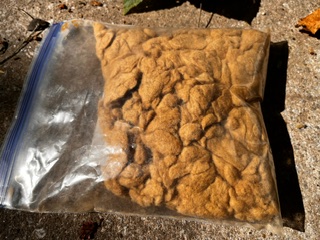
We replied that the insulation show here looks like mineral wool. The alternative, chopped fiberglass, does not usally appear in rounded lumps.
Compare your photos with those above on this page and also with fibrous insulation photos seen
at INSULATION IDENTIFICATION GUIDE - home - Daniel
...
Sears / Homart Mineral Wool Insulation
Identification Photo of Sears Homart "Best of All" Mineral Fill & Homart Pellet Type Rock Wool Insulation
I can't find ANY information on vermiculite from Homart and Sears (best of all insulation) I found 2 bags in my attic and will be sending it out for a test but was trying to find some product info in the meantime.
Below: Homart Pellet Type Rock Wool Insulation.
I'm attaching pics if anyone has information it would be greatly appreciated.
Below: Here is the Sears Roebuck "Best of All" Mineral Fill insulation bag. - 2021-02-02 by Coleman -
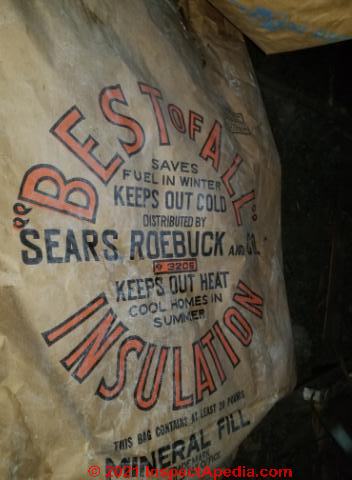
Reply by (mod) - don't confuse mineral wool or rock wool with vermiculite insulation
Coleman, thank you for the photos of Sears insulation bag and batt cover/vapor barrier. We will certainly keep these with this article series.
Typically national brands like Sears contracted to buy their materials from more than one supplier, depending on availability and price; so it is possible that **IF** you have vermiculite insulation sold by Sears, that least some Sears vermiculite came from the Libby mine; until I can find more specific details it would be prudent to treat the Sears Vermiculite as presumed to contain asbestos.Really? Well not quite. Both of your packages describe insulation that may not be vermiculite at all but rather mineral wool or rock wool.
The "Sears Homart Pellet Type Rock Wool" shown in your first photo is definitely a mineral wool insulation product, not vermiculite.
Sears Homart Rock Wool Insulation was a 1950s product sold by Sears Roebuck & Co. - here's an example pamphlet from an eBay sale. You'll see that Sears sold rock wool insulation as both pellets and in batts.
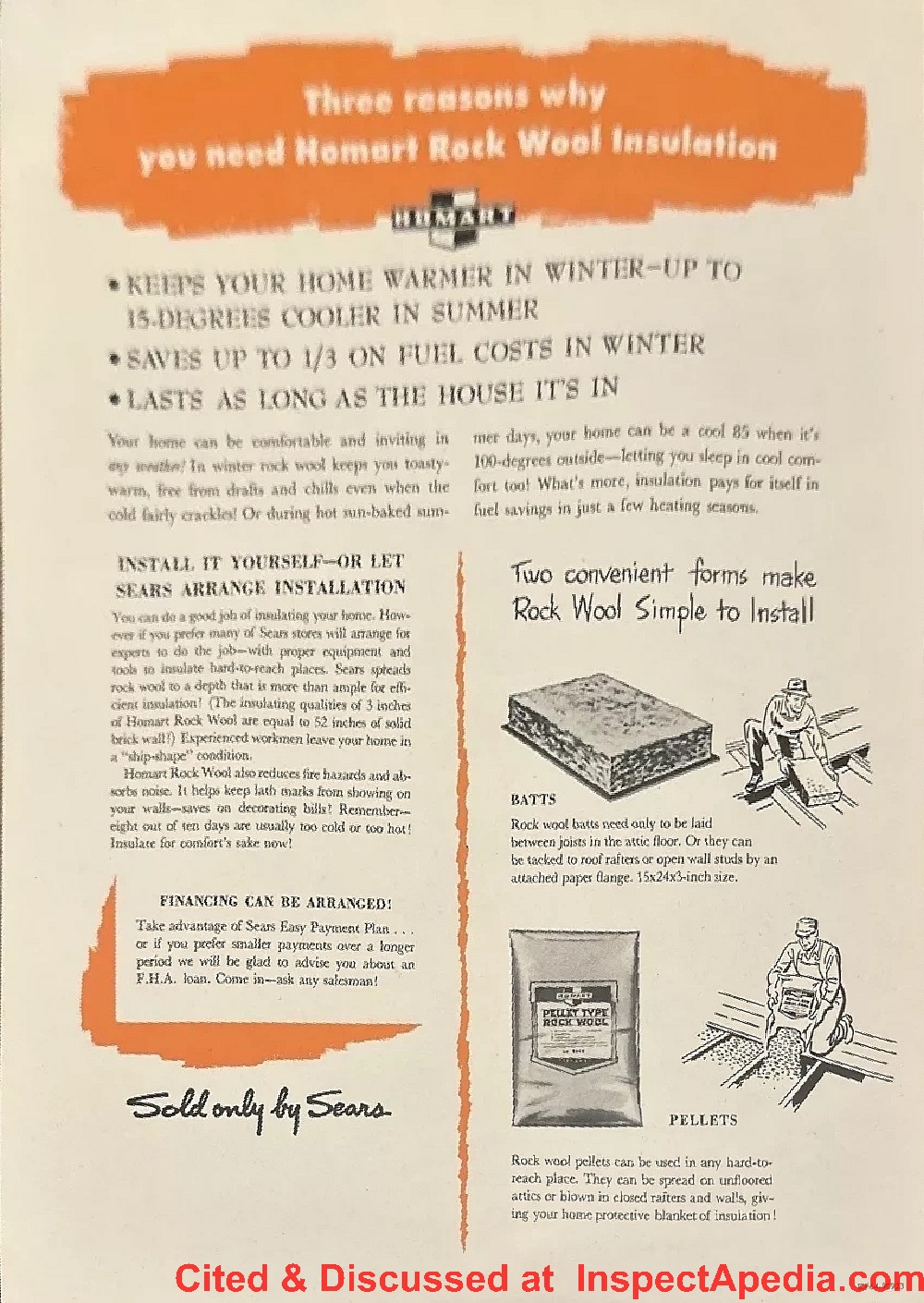
Please post a photo of what the actual insulation itself looks like so that we can confirm what it is.
Rock Wool or mineral wool insulation is not a vermiculite product.See details at
MINERAL WOOL IDENTIFICATION, APPEARANCE VARIATIONS
In your second photo the "Sears Roebuck Best of All Insulation package labeling describes the product as "Mineral Fill" - that is almost certainly mineral wool, too. But you should compare the actual insulation material with the photos
...
Feltrock Mineral Wool
Other older mineral wool insulation products sold at the same time included a less-known brand, Feltrok insulation, from the Feltrok Insulation Manufacturing Company, a Tacoma, Washington company. This Feltrok ad appeared on a matchbook cover sold on eBay in 2024.
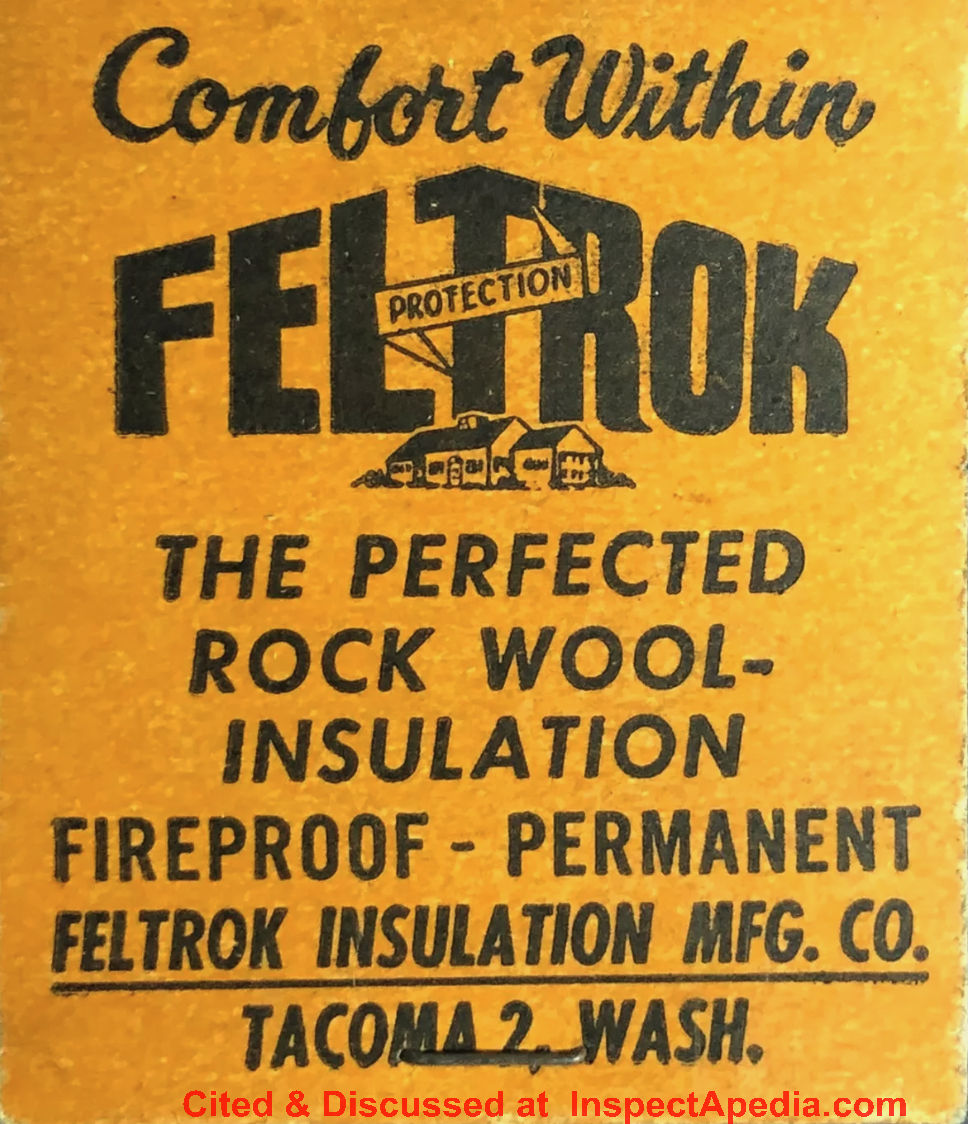
...
...
Continue reading at MINERAL WOOL by MICROSCOPE or select a topic from the closely-related articles below, or see the complete ARTICLE INDEX.
Or see MINERAL WOOL IDENTIFICATION, APPEARANCE VARIATIONS FAQs - questions and answers posted originally on this page.
Or see these
Recommended Articles
- ASBESTOS-FREE INSULATION MATERIALS
- ASBESTOS INSULATION
- BALSAM WOOL BATT INSULATION - a cellulose product, not a mineral fiber
- FIBERGLASS INSULATION IDENTIFICATION & PROPERTIES - home
- INSULATION IDENTIFICATION GUIDE - home
- MINERAL WOOL - ROCK WOOL INSULATION
- CAREY ROCK WOOL CATALOG 1950 [PDF]
- MINERAL WOOL IDENTIFICATION, APPEARANCE
- MINERAL WOOL IDENTIFICATION by MICROSCOPE
- MINERAL / SLAG WOOL AIRBORNE PARTICLES
- MINERAL WOOL / STONE WOOL ASBESTOS CONTENT
- MINERAL WOOL / ROCK WOOL DEFINITIONS
- MINERAL WOOL / ROCKWOOL COMPOSITION
- MINERAL or SLAG WOOL HEALTH EFFECTS
- MINERAL / ROCK WOOL INSTALLATION, SETTLING
- MINERAL WOOL / STONE WOOL R-VALUES
- SPINTEX MINERAL WOOL PROPERTIES - MANSVILLE
Suggested citation for this web page
MINERAL WOOL IDENTIFICATION, APPEARANCE VARIATIONS at InspectApedia.com - online encyclopedia of building & environmental inspection, testing, diagnosis, repair, & problem prevention advice.
Or see this
INDEX to RELATED ARTICLES: ARTICLE INDEX to BUILDING INSULATION
Or use the SEARCH BOX found below to Ask a Question or Search InspectApedia
Ask a Question or Search InspectApedia
Try the search box just below, or if you prefer, post a question or comment in the Comments box below and we will respond promptly.
Search the InspectApedia website
Note: appearance of your Comment below may be delayed: if your comment contains an image, photograph, web link, or text that looks to the software as if it might be a web link, your posting will appear after it has been approved by a moderator. Apologies for the delay.
Only one image can be added per comment but you can post as many comments, and therefore images, as you like.
You will not receive a notification when a response to your question has been posted.
Please bookmark this page to make it easy for you to check back for our response.
IF above you see "Comment Form is loading comments..." then COMMENT BOX - countable.ca / bawkbox.com IS NOT WORKING.
In any case you are welcome to send an email directly to us at InspectApedia.com at editor@inspectApedia.com
We'll reply to you directly. Please help us help you by noting, in your email, the URL of the InspectApedia page where you wanted to comment.
Citations & References
In addition to any citations in the article above, a full list is available on request.
- Cummings, J. M. "Possibilities for the Manufacture of Mineral Wool in British Columbia" [PDF], British Columbia Department of Mines, (1937)- includes tables comparing properties of various insulation and other materials to mineral wool and balsam wool, retrieved 12/6/2014, original source: http://142.32.76.167/Mining/Geoscience/ PublicationsCatalogue/MiscellaneousPublications/ Documents/PossibilitiesManufactureMineralWool1937.pdf
- [1] Seattle Energy Code, Seattle Energy Code History, web search 12/6/2011, original source: http://www.seattle.gov/dpd/Codes/Energy_Code/Overview/history.asp
- Kim, K-A., W. K. Lee, J. K. Kim, M-S. Seo, Y. Lim, K-H. Lee, G. Chae, S-H. Lee, and Y. Chung. "Mechanism of refractory ceramic fiber-and rock wool-induced cytotoxicity in alveolar macrophages." International archives of occupational and environmental health 74, no. 1 (2000): 9-15.
- Marabini, Anna Maria, Paolo Plescia, Dante Maccari, Francesco Burragato, and Mario Pelino. "New materials from industrial and mining wastes: glass-ceramics and glass-and rock-wool fibre." International journal of mineral processing 53, no. 1 (1998): 121-134.
- Marsh, G., R. Stone, A. Youk, T. Smith, M. Quinn, V. Henderson, L. Schall, L. Wayne, and K. Lee. "Mortality among United States rock wool and slag wool workers: 1989 update." JOURNAL OF OCCUPATIONAL HEALTH AND SAFETY AUSTRALIA AND NEW ZEALAND 12 (1996): 297-312.
- The National Institute of Standards and Technology, NIST (nee National Bureau of Standards NBS) is a US government agency - see www.nist.gov
- "A Parametric Study of Wall Moisture Contents Using a Revised Variable Indoor Relative Humidity Version of the "Moist" Transient Heat and Moisture Transfer Model [copy on file as/interiors/MOIST_Model_NIST_b95074.pdf ] - ", George Tsongas, Doug Burch, Carolyn Roos, Malcom Cunningham; this paper describes software and the prediction of wall moisture contents. - PDF Document from NIS
- In addition to citations & references found in this article, see the research citations given at the end of the related articles found at our suggested
CONTINUE READING or RECOMMENDED ARTICLES.
- Carson, Dunlop & Associates Ltd., 120 Carlton Street Suite 407, Toronto ON M5A 4K2. Tel: (416) 964-9415 1-800-268-7070 Email: info@carsondunlop.com. Alan Carson is a past president of ASHI, the American Society of Home Inspectors.
Thanks to Alan Carson and Bob Dunlop, for permission for InspectAPedia to use text excerpts from The HOME REFERENCE BOOK - the Encyclopedia of Homes and to use illustrations from The ILLUSTRATED HOME .
Carson Dunlop Associates provides extensive home inspection education and report writing material. In gratitude we provide links to tsome Carson Dunlop Associates products and services.


